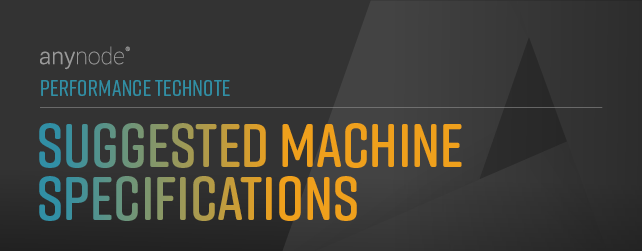
Suggested Machine Specifications
For both virtual and real-world usage scenarios, especially those involving partial transcoding, we advise utilizing a system with a minimum of two CPU cores. For enhanced processing capabilities, we have assumed a CPU clock speed of 3.5 GHz.
Additionally, we strongly recommend employing SSDs (Solid State Drives), while discouraging the use of traditional spinning hard drives.
These specifications form the foundation for a robust and efficient environment to harness the full potential of anynode, regardless of your chosen deployment method.
Entry-Level System (up to 50 Sessions)
Debian 11/12/13
-
2 CPU Cores
-
2 GB RAM
-
120 GB Drive Space
Windows 2019/2022 Server
-
2 CPU Cores
-
4 GB RAM
-
120 GB Drive Space
Standard System (up to 300 Sessions)
Debian 11/12/13
-
4 CPU Cores
-
4 GB RAM
-
240 GB Drive Space
Windows 2019/2022 Server
-
4 CPU Cores
-
8 GB RAM
-
240 GB Drive Space
High End System (up to 1,000 Sessions)
Debian 11/12/13
-
16 CPU Cores
-
8 GB
-
500 GB Drive Space
Windows 2019/2022 Server
-
16 CPU Cores
-
8 GB RAM
-
500 GB Drive Space
Azure Machines
We recommend the B- and F-series. You can switch between the models later. B-series burstable VMs are sufficient in most cases. If your sessions are constantly busy all day, you should consider taking an F-series. The F-series are optimized VM sizes that have a high CPU-to-memory ratio. If you have a busy contact center and you need the entire number of concurrent calls all day, the F-series is suitable because it guarantees power consistently. Here, we recommend the F-Series with their Platinum 8370C 3.4-3.7 GHz processors. F-Series virtual machines are tailored for compute-intensive workloads. Discover additional Azure Series on the Virtual Machine series page.
Windows Server 2019 and 2022
-
F2s, 120
-
F4s, 350
-
F8s, 650
Debian 11
-
F2s, 150
-
F4s, 350
-
F8s, 650
VMware Edition: A minimal virtual machine setup with only the user account pre-configured. No Microsoft Teams firewall rules are included.
Template Edition: This edition comes with predefined Microsoft Teams firewall rules (provided as XML/JSON templates).
CPU Selection
When striving to accommodate a substantial volume of simultaneous sessions on a system, selecting a CPU with a high clock speed is highly recommended. The session count correlates closely with the CPU clock rate. Moreover, doubling the quantity of CPU cores usually results in a roughly 50% boost in potential session capacity.